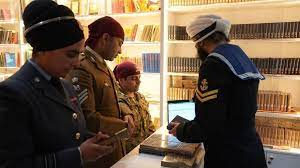LONDON, Nov 10: For the first time in a century, daily prayer books have been issued to Sikh military personnel in the British forces.
Major Daljinder Singh Virdee is in the British Army and has spent two years campaigning for the change, BBC reported.
The prayer books, called Nitnem Gutkas, were issued by the UK Defence Sikh Network at a ceremony in London.
The Ministry of Defence said it hopes to “directly support Sikhs practice a key component of their faith”, the BBC reported.
The Nitnem Gutkas have been printed in three languages in durable and waterproof material to withstand the rigours of military life.
The British Army Gutka has a camouflage cover, and the Royal Navy and RAF Gutka has a navy blue cover.
Major Singh Virdee said he uses his Nitnem Gutka three times a day.
“The Army has been providing Christian religious texts for many years and I saw the opportunity there to open the door for the Sikh faith to provide Sikh texts,” he said.
The Nitnem Gutkas were printed in Wiltshire and placed on a throne in a purpose-built vehicle for Sikh scriptures, the BBC reported.
They were transported to the library of the Central Gurdwara temple in London, where they were officially issued to military personnel on October 28.
As chairperson of the UK Defence Sikh Network, Major Singh Virdee has spent the past two years on the project.
“For Sikh’s our scriptures are not just words, they are the living embodiment of our guru. We draw moral strength and physical strength from reading the scriptures every day, it gives us discipline and it grows us spiritually,” he said.
Nitnem Gutkas were first issued to military personnel more than a century ago, along with other articles of the Sikh faith including steel daggers, bracelets and wooden combs, but have never been issued again since, the report said.
There is an original military-issued Nitnem Gutka in the National Army Museum’s archives, in London.
He said Sikh soldiers were recruited to the British military from the 1840s onwards.
“One of the main reasons is because they’d fought so well, they had a martial tradition,” he was quoted as saying. “They were very keen to reinforce the religious and martial traditions of the Sikh soldiers.”
(UNI)
Trending Now
E-Paper


